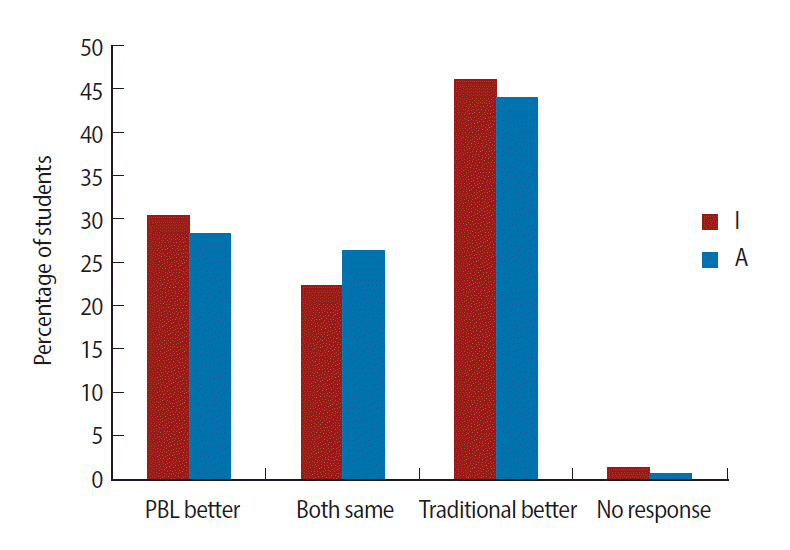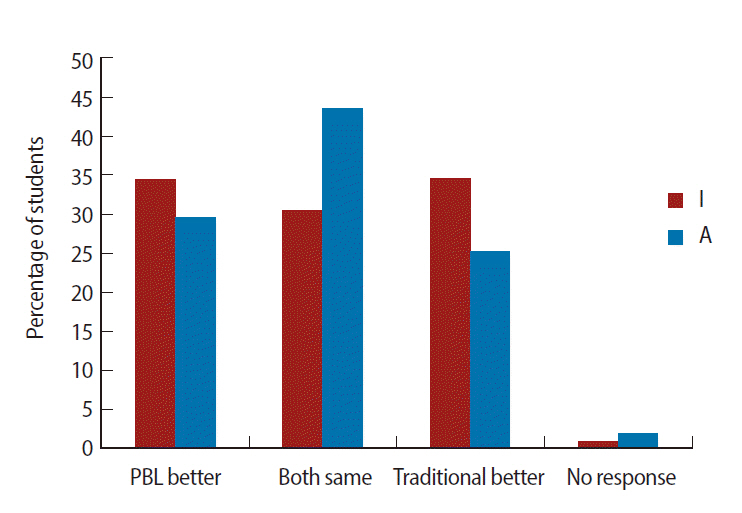J Educ Eval Health Prof.
2013;10:11.
Indian medical students' perspectives on problem-based learning experiences in the undergraduate curriculum: One size does not fit all
- Affiliations
-
- 1Department of Physiology, School of Medical Sciences and Research, Sharda University, Greater Noida, Uttar Pradesh, India.
- 2Department of Physiology, Kasturba Medical College, Manipal, Manipal University, Manipal, Karnataka, India. drmanjunatha@gmail.com
Abstract
- PURPOSE
Problem-based learning (PBL) is a well-established method for facilitating the learning of basic science concepts in the context of clinical cases. Relevant evidence is lacking regarding PBL's effectiveness and acceptability as perceived by students accustomed to classical traditional teaching in India. Hence, this study gathered students' opinions on PBL versus Traditional teaching methods to generate a foundation for institutional policymaking and ultimately, changes in the policy of regulatory bodies.
METHODS
A total of 773 first year medical students admitted from 2007-2010 in Kasturba Medical College Manipal, Manipal University, India were asked to respond to a 15-item questionnaire evaluating their preferences for PBL or traditional methods such as lectures after undergoing a systematically conducted PBL session in physiology. Their responses were analyzed with an unpaired t-test. Their comments were also collected.
RESULTS
PBL scored significantly higher for most items in the questionnaire for "learning efficiency" and "student-teacher relationship". The students' comments highlighted the importance of a trained tutor/facilitator to enhance the learning process.
CONCLUSION
Our students are willing to adapt to the PBL method, although they recognize certain benefits of traditional pedagogy. For learning efficiency and the student-teacher relationship, the students feel that neither method holds an advantage. We recommend that the future medical curriculum in India be a hybrid form of PBL and traditional methods with specific training on the unfamiliar PBL approach for both faculty and students.
MeSH Terms
Figure
Reference
-
1. Schmidt HG. Problem-based learning: rationale and description. Med Educ. 1983; 17:11–16. http://dx.doi.org/10.1111/j.1365-2923.1983.tb01086.x.
Article2. Norman GR, Schmidt HG. The psychological basis of problembased learning: a review of the evidence. Acad Med. 1992; 67:557–565. http://dx.doi.org/10.1097/00001888-199209000-00002.3. Vernon DT, Blake RL. Does problem-based learning work? A meta-analysis of evaluative research. Acad Med. 1993; 68:550–563. http://dx.doi.org/10.1097/00001888-199307000-00015.
Article4. Sanson-Fisher RW, Lynagh MC. Problem-based learning: a dissemination success story? Med J Aust. 2005; 183:258–260. https://www.mja.com.au/journal/2005/183/5/problem-based-learningdissemination-success-story.5. Prince KJ, van Mameren H, Hylkema N, Drukker J, Scherpbier AJ, van der Vleuten CP. Does problem-based learning lead to deficiencies in basic science knowledge? An empirical case on anatomy. Med Educ. 2003; 37:15–21. http://dx.doi.org/10.1046/j.1365-2923.2003.01402.x.
Article6. Bernstein P, Tipping J, Bercovitz K, Skinner HA. Shifting students and faculty to a PBL curriculum: attitudes changed and lessons learned. Acad Med. 1995; 70:245–247. http://dx.doi.org/10.1097/00001888-199503000-00019.7. Hartling L, Spooner C, Tjosvold L, Oswald A. Problem-based learning in pre-clinical medical education: 22 years of outcome research. Med Teach. 2010; 32:28–35. http://dx.doi.org/10.3109/01421590903200789.
Article8. Nandi PL, Chan JN, Chan CP, Chan P, Chan LP. Undergraduate medical education: comparison of problem-based learning and conventional teaching. Hong Kong Med J. 2000; 6:301–306. http://www.hkmj.org/article_pdfs/hkm0009p301.pdf.9. DiCarlo SE. Too much content, not enough thinking, and too little fun! Adv Physiol Educ. 2009; 33:257–264. http://dx.doi.org/10.1152/advan.00075.2009.
Article10. Onyon C. Problem-based learning: a review of the educational and psychological theory. Clin Teach. 2012; 9:22–26. http://dx.doi.org/10.1111/j.1743-498X.2011.00501.x.
Article11. Wood DF. ABC of learning and teaching in medicine: problembased learning. BMJ. 2003; 326:328. http://dx.doi.org/10.1136/bmj.326.7384.328.12. Savin-Baden M. Disciplinary differences or modes of curriculum practice? Who promised to deliver what in problem-based learning? Biochem Mol Biol Educ. 2003; 31:338–343. http://dx.doi.org/10.1002/bmb.2003.494031050263.
Article13. Tucker CM, Herman KC. Using culturally sensitive theories and research to meet the academic needs of low-income African American children. Am Psychol. 2002; 57:762–773. http://dx.doi.org/10.1037/0003-066X.57.10.762.
Article14. Millan LP, Semer B, Rodrigues JM, Gianini RJ. Traditional learning and problem-based learning: self-perception of preparedness for internship. Rev Assoc Med Bras. 2012; 58:594–599. http://dx.doi.org/10.1590/S0104-42302012000500018.15. Wiznia D, Korom R, Marzuk P, Safdieh J, Grafstein B. PBL 2.0: enhancing problem-based learning through increased student participation. Med Educ Online. 2012; 17:17375. http://dx.doi.org/10.3402/meo.v17i0.17375. Epub 2012 Jun 11.
Article16. Gwee MC. Globalization of problem-based learning (PBL): crosscultural implications. Kaohsiung J Med Sci. 2008; 24((3 Suppl)):S14–S22. http://dx.doi.org/10.1016/S1607-551X(08)70089-5.17. Khoo HE. Implementation of problem-based learning in Asian medical schools and students’ perceptions of their experience. Med Educ. 2003; 37:401–409. http://dx.doi.org/10.1046/j.1365-2923.2003.01489.x.
Article
- Full Text Links
- Actions
-
Cited
- CITED
-
- Close
- Share
- Similar articles
-
- Integrating Problem-Based Learning into Clinical Clerkship: A Pilot Study
- Learning experience of undergraduate medical students during ‘model preparation’ of physiological concepts
- Perspectives of Nurse Students on Problem-Based Learning: Learning Experience in Pediatric Nursing
- Analysis of Factors Affecting Problem Based Learning
- Course-based research experience of undergraduate medical students through project-based learning




